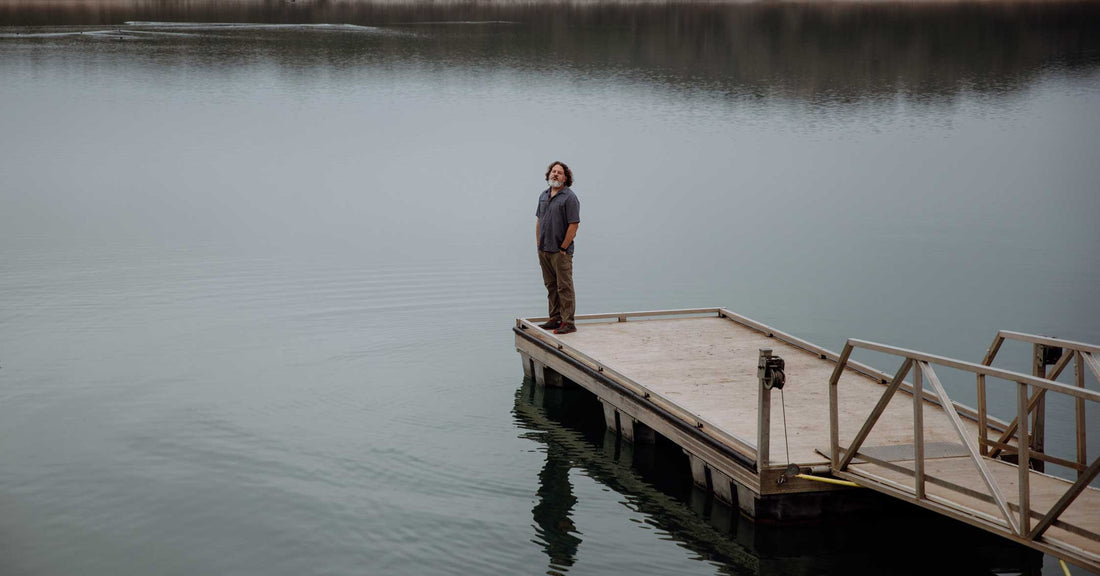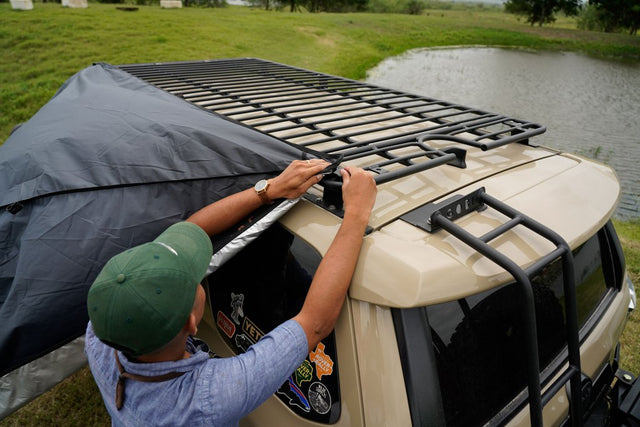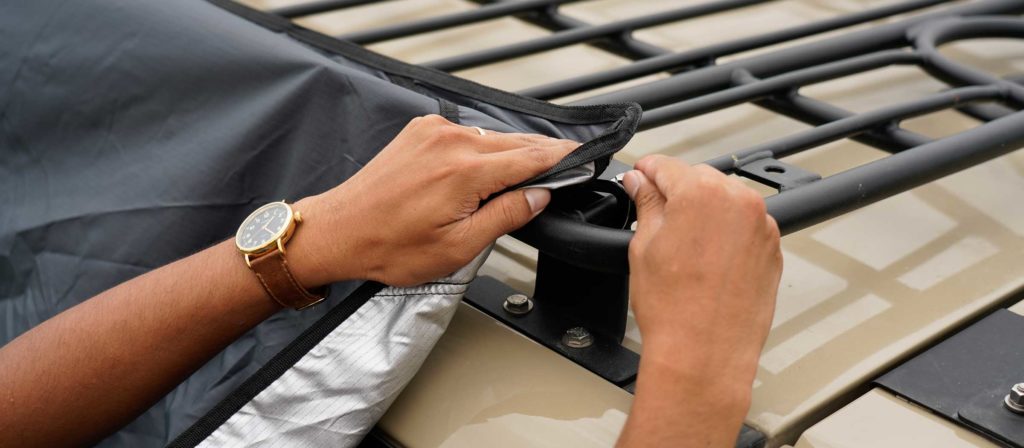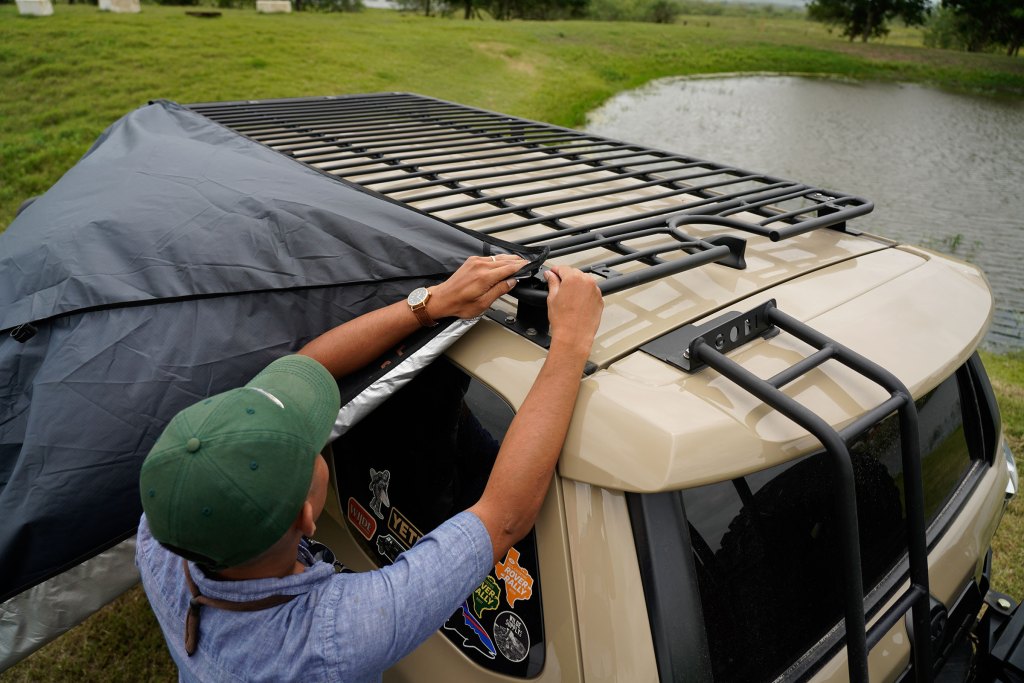
"It’s the natural thing to do for this kind of animal. We’re the only animal that’s put ourselves in zoos of our own creation, right? And we don’t even make the zoos natural to who we are. Maybe that’s what it is. That’s what the van is. The van is my Zoo outside of the box where I live."
—Paul Darilek
Filmmaker’s Notes
For the first of the interviews that would eventually become the “On the Road” series, we (Henry, Moon co-founder, and Richard, photographer) hit the road for three weeks on a journey that quickly took us from acquaintances to friends, sleeping in the Moon van on the nights that we didn’t camp, and sharing our own stories. Our road trip started with a plan to meet and record our conversations with a handful of different people we’d found that are all connected by their individual pursuit of a more nomadic, more free, and less “normal” lifestyle. For the people that we met on the road, the inspiration for some kind of counter-cultural life comes intrinsically for some; others are motivated by external events — for Paul, the first subject of the series, that inspiration came to him as an unexpected vision, and a really good deal on a 1996 Ford E-150.
Richard and I met Paul deep in Texas Hill Country, at a state park where he’d parked his van (which he also refers to as his “mobile office”). We had started our trip from Austin, and after swinging by the MOON warehouse to pick up some shades and another stop for pots and pans for cooking in the van, the couple hundred miles of asphalt had disappeared quickly in our rear view, motivated by a perfect combination of coffee and the kind of buzzy excitement that comes with the start of an adventure.
Paul is a writer, father, and a self-proclaimed adventure-seeker. I (Henry) met Paul years ago, when I was still in school— full disclosure, he was actually my boss. I was working at Living Water International, a nonprofit whose focus was creating clean water opportunities for communities in developing countries. Paul was a mentor that had spent many of his formative years backpacking through and living in Central America, learning how to survive with very little and gaining a firsthand understanding of how difficult it was to find access to clean water in places without infrastructure, experiences that eventually led him to his role at Living Water.

Read the Interview
Henry:
All right Paul— go for it.
Paul:
Okay. The story behind this van is that I was at a retreat. And I had these closed-eye visions of a van. I’m not kidding. And I thought, why am I seeing a van? Oh, well, no clue— I went on trying to focus on better mental content. Weeks after the retreat, my parents’ neighbor is selling this van for 1200 bucks.
I said, “Will you take 900?”
He said, yeah.
I’d been wanting something I could go on the road with, mostly for family fun, but also for officing anywhere. Then I started remodeling the inside. It was just a cheap project that went from zero-to-fun. I just tore everything out of the inside till it was bare, then just put down a plywood and linoleum floor, and moved the captain’s chairs up six inches to make room for a bed— kind of in a rush before July 4th vacation.
I had these closed-eye visions of a van. I’m not kidding.
Our first trip was to North Carolina, to the Smoky Mountains to see cousins, so it was a fun road trip. But the real value of the van has been facilitating fun all the time….I come out to this lake, half an hour from my house— I office here. I end my days swimming into the sunset. And it’s just a better quality of life.
When you think about how we measure our quality of life, it’s often financial goals, or the house you live in, but for me — I realized last summer — it’s the portion of nights that I spend swimming into the sunset. That’s a better indicator of my quality of life, of how I’m gonna feel moment to moment that night and the next day, more than anything else.


Henry:
What do the kids think of the van? Is this Paul’s vehicle or the family vehicle?
Paul:
It’s the family vehicle. My 18 year old daughter and I kind of arm wrestle for it every other weekend. She takes it out. You know, she’s got a couple friends that she hangs out with during this whole COVID fiasco. And so it’s fun. I feel great when she takes it out for adventures. She’ll go camping, she’ll take her little brother to the coast, and they’ll live on the road, a 15 year old and an 18 year old.
… It’s the portion of the nights that I spend swimming into the sunset. That’s a better indicator of my quality of life
Henry:
Take me back to your first experience of the freedom of the road, whether it’s in a car, motorcycle, whatever….that visual memory that really just sticks with you of being on the road— what comes to mind?
Paul:
My parents were actually epic road-trippers, in a Ford Econoline ii 150 that was light blue just like this one is, except in 1976. So my fondest childhood memories are loading up that van…we could take off and just live in it for the full family vacation. More years than not, my mom was calling the school and saying we’re gonna be a couple weeks late to start school this year.
We’d wait outside the office building where my dad worked, Southwest Research Institute, and I’d see my then-1970s hippie dad coming out of his job as an engineer, pulling off that tie, and we’d jump in and cruise down south to Mexico. I was a kid so it was like drinking new fruit flavored sodas. The adults would always go explore these caves and I was like a four year old so I’d just hang out on the outside with the Mexican teenage girls— I had blonde curly hair and they’d go crazy over me. And it was just fun because where we were everybody speaks a different language….those were some of our best family times.
Henry:
Is that how you learned to speak Spanish?
Paul:
No, I learned while backpacking around Central America. I wanted to take off to Central America, so I had my mom sell my Harley, and I took the money and left. That all started out as an adventure to learn Spanish. And then I ended up staying.




Henry:
This is where I really want to interject— for me, you’ve always been a person that’s going to wander, looking for adventure, looking for new things. I think this is something that I’ve tried to learn. When we knew each other and worked together, (we took) international trips, and you were all over before that, El Salvador, etc. Something you said earlier is that you don’t really want to go to places without your family, or you don’t want to go too far— you used to go across the world, are you finding a similar sense of joy and adventure just going 20 minutes away from home?
Paul:
Do you know how old I am Henry? Just out of curiosity.
Henry:
Like late 40s?
Paul:
I’m 50 years old. I just turned 50 in August. And I think that’s what you’re talking about, about adventure, just like as a thing. Adventure. I’m realizing at this stage in my life it’s really a core thing to who I am, it’s why I put on a backpack and moved to Central America. It’s why I spent those years in the mountains of El Salvador listening to people’s war stories, or going to Guatemala and learning what life was like for these Kakchiquel or Quiche people there, and I feel like when I look back, my life has felt like things just work when life feels like an adventure.
And other times, you know, I might have a better job title, and a higher salary. There’s something about life that doesn’t feel like the winds at my back. I don’t know, I think I’m kind of considering that, oh, all the forces of our culture want to put you in an office somewhere, or connected to your computer. I guess I’m realizing that adventure is…something to be integrated into life, in the same way that exercise or diet is, that it’s kind of a necessity of the human animal.
And so now I’m looking for that, while trying to leverage all the opportunities that this COVID-19 situation has given us. Everybody’s learning how to work remotely, so what does that mean about where you can be, where you can spend your time, what you do with it? I’m still looking forward to the next phases of adventure. Some of them will be on the road, some of them will probably be in the Amazon, in South America. But when I’m here, at my United States home in San Antonio, I love being able to jump in this little thing and just go. We’ve probably got six gorgeous state parks within 90 minutes of here, and I can go live there.



Henry:
What is the rhythm? When you’re spending time outside, what are the things that you find yourself doing?
Paul:
Increasingly I find it’s something even more primal than recreation….the more I get out in nature, the more I feel like it’s just part of embracing who you are as a human animal.
There’s the studies in prisons, for example, where they’ll take a fourth floor of the prison—everybody’s in there for the same kinds of crimes, randomly assigned to cells, the only difference between Group A and Group B is one faces a forest, and one faces a highway.
Adventure is something to be integrated into life, in the same way that exercise or diet is, that it’s kind of a necessity of the human animal.
When you look at those (studies), for the people who faced the forest, just seeing trees led to statistically lower (stress), better behavior, lower recidivism. They were more likely for early release.
There’s something really deep in us (about nature) that isn’t just aesthetic, it’s just settling into who you really are as a being. Just something about the way the light shimmers on water, it’s like staring into a fire. Or when you look at the stars, you feel how small you are. Staring into a fire, why are we so entertained by that? It’s probably because it’s been in our DNA since we’ve been homosapiens. It’s the natural thing to do for this kind of animal. We’re the only animal that’s put ourself in zoos of our own creation, right? And we don’t even make the zoos natural to who we are. Maybe that’s what it is. That’s what the van is. The van is my Zoo outside of the box where I live. The thing about van life is, it’s a place to sleep and you spend the rest of it outside. That’s what’s fun about it. Just being.
Staring into a fire, why are we so entertained by that? It’s probably because it’s been in our DNA since we’ve been homosapiens.
Henry:
And as we kind of look around the world, what do you hope for your kids? Like, what do you hope they see in terms of adventure that they might, you know, learn for themselves?
Paul:
Yeah, those are all good questions. I think about it a lot, especially with my daughter, because she’s a lot like me, she has that sense of adventure, that appreciation of natural beauty, that same not-wanting-to-end-up-in-a-nine-to-five-until-you-retire-and-then-die kind of life. Just embracing life….that’s what I like to see in my kids, is embracing life. And nobody lays on their deathbed and regrets the fun adventures that they had. People always invariably regret dedicating their time to things, not experiences. You are the sum of your experiences in a way that you’re not the sum of your things, you know.
So I get to see that a bit in my daughter in this van, because she’s got that spirit of adventure. We’ve got a cool situation in America, there’s a fun tradition. I remember when I was young and read Jack Kerouac….you just want to be on the road, and America is a country where we can do that.

Henry:
I mean, we’re gonna call this series “On the Road”. I can’t think of a more universal analogy for adventure in the US, and I think Kerouac has something to do with that, maybe it’s something that’s always been part of our culture.
In your experience, do you have an active nostalgia for life on the road?
Paul:
One source of on-the-road-nostalgia is the time I spent traveling as a kid with my family….I think it goes even deeper than that, though. I think it makes sense to say that we’re intended to be freer than we really are. So okay— we’ve been primates, what do they say for a couple million years, and we’ve been homosapiens for a couple hundred thousand. And it’s only in this last little blip, you know, post-agrarian revolution that we’ve had lives that were tied to civilization. When I’ve talked to people that hang out with hunter-gatherers, they say, there’s no such thing as depression — every day is just some adventure. It’s improving your home.
I think it makes sense to say that we’re intended to be freer than we really are.
Yeah, I think that’s what it is….I think we have our hunter gatherer minds in the back of our head (when we’re) in the van and being on the road. And that sense of freedom feels more like that natural setting than life in the office.

Before we left Paul, we watched him put on his wetsuit and swim out into the setting sun, a poetic ending to the conversation we’d had together. After our goodbyes, we jumped back into the van, fully inspired and itching to get the wheels rolling again, and we had a long drive to Oklahoma City ahead and a couple of surprises waiting for us. From that first evening on, we half-jokingly referred back to Paul as “the Prophet”— not just because of his eloquence and sage-like demeanor, but also because so many of the themes that he spoke about on that first interview were laced through so many of the following stories that we would hear from others we’d meet along the way.






